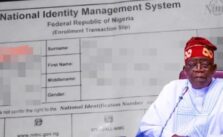The National Identity Management Commission (NIMC) has identified over 6,000 Nigeriens who were illegally registered in its database with the National Identification Number (NIN). This revelation comes amid President Bola Tinubu’s directive for a comprehensive update of the National Social Register to support the Federal Government’s social investment programmes.
Punch reported that sources at the Presidency disclosed that on February 4, 2025, Minister of Interior Olubunmi Tunji-Ojo briefed the Federal Executive Council (FEC) on the activities of the NIMC, which operates under his ministry. The minister confirmed that the NINs obtained by illegal holders had been withdrawn as part of an ongoing database clean-up.
The issue of fraudulent NIN registrations gained attention in October 2022 when the Defence Headquarters announced that fake NIMC officials had been apprehended. Major General Musa Danmadami, then Director of Defence Media Operations, revealed that the suspects had visited the Gagamari IDP camp in Niger Republic to register non-Nigerians. Items recovered from the suspects included a NIN registration machine, printing and laminating machines, a generator, and other equipment. It was alleged that the fake agents charged foreigners, mostly from neighboring countries, to obtain NINs, a practice particularly rampant in border communities.
The NIN is a unique 11-digit number tied to an individual’s biometric and demographic data, used to verify identity for government and private transactions. The Presidency emphasized the importance of ensuring the database accurately reflects the details of vulnerable Nigerians eligible for social interventions, such as student loans and cash transfers.
“It was the Minister of Interior that gave that briefing,” a source disclosed. “The interior minister said NIMC is tidying up the database because they found over 6,000 people from Niger Republic who obtained NIN. But they have been wiped from the database.”
The briefing led to President Tinubu instructing the national security adviser and the interior minister to join an inter-ministerial committee overseeing the humanitarian ministry. This directive aligns with Tinubu’s earlier efforts to reform the country’s social investment programmes, including suspending these initiatives in January 2024 for a comprehensive review.
NIMC Director-General Bisoye Coker-Odusote reiterated the agency’s commitment to transparency and accuracy in data management. “The NIN ensures that people collecting money are not ghost beneficiaries,” she said. “You have to use a verifiable set of records to identify them. This saves the country a lot of money and ensures transparency.”
Coker-Odusote also clarified that recent issues related to NIN-SIM linkage were due to glitches on the telecommunications companies’ end, not NIMC. She stressed the importance of the NIN in verifying identities for payments tied to the National Social Register, ensuring funds are disbursed to genuine beneficiaries.
Experts have highlighted the risks posed by undocumented foreigners holding NINs, attributing the problem to porous borders and a lack of political will. Retired Brigadier General Aliyu Momoh stated, “Everywhere you go in some northern states, you see many non-Nigerians moving freely without documentation. Can Nigerians do that in Chad or Cameroon? No! But I will give it to the current leadership. There is so much to be done, but progress is being made.”

